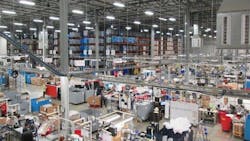Vitamix’s Continuous Improvement Journey -IW Manufacturing & Technology Conference & Expo Preview
Vitamix had a delicious dilemma. The manufacturer of high-end blenders had experienced year after year of double digit growth. It had sat out the recession as consumers wanted to eat healthier and the ability to make juices and smoothies at home was a convenient way to achieve this goal. They were also willing to spend money on high value products for health purposes.
“It was the perfect storm,” Eric DiMalanta, lean manager for Vitamix explained. “And our sales took off.” The company also produces blending equipment for the commercial market.
While continually adding employees to meet demand, the company felt that workforce growth needed to include creating a culture of continuous improvement.
The company had tried lean back in 2006, but it wasn’t a comprehensive approach. The production manager was solely focused on meeting growing demand so efforts to create a formal continuous program wasn’t feasible.
In 2012, after seven years of double-digit growth, the company decided to bring on board a continuous improvement manager. “We felt we couldn’t just continue to hire more people, but instead wanted to use our current workforce, as well as new hires, more effectively,” said DiMalanta.
DiMalanta created the department and systemically implemented lean. “Instead of random acts of improvement, we needed an organized structure in place,” explained DiMalanta. A committee met regularly to remove any roadblocks to progress and to create standards.
He followed a model that included classic components of lean; Align and Stabilize, Visual Management and Standardize People and Process. Problem solving is a continuous activity and over the past five years lean has become part of the company’s DNA.
Vitamix's lean process will be on display as the company is conducting a plant tour during the IndustryWeek Manufacturing & Technology Conference & Expo in Cleveland, Ohio on May 8-10.
In creating a lean culture, DiMalanta explained he doesn't focus on cost savings, as he feels it drives the wrong decision. “If you do Kaizens the emphasis is on improvement. We try and remove frustrations and make work more fun. We want our employees to be inspired. “
The company holds quick and easy kaizens events and blitzes, dozens per year. “Our employees are very engaged in the process and see value to it,” said DiMalanta.
The value of the continuous improvement culture has in turn produced value for the company. Since 2013 the company has seen 45% year over year growth and DiMalanta said that lean is a large part of that.
